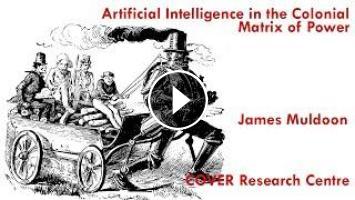Artificial Intelligence in the Colonial Matrix of Power
James Muldoon, University of Essex
This paper theorises how a system of coloniality underpins the structuring logic of artificial intelligence systems. Drawing on the analytic of the ‘colonial matrix of power’ developed by Aníbal Quijano and the Latin American modernity/coloniality research program, the paper develops a framework for critiquing the regimes of global labour exploitation and knowledge extraction that are rendered invisible through discourses of the purported universality and objectivity of AI. There are three main parts to this argument. First, the global economic and political power imbalances in AI production are inextricably linked to the continuities of historical colonialism, constituting the colonial supply chain of AI. Second, this is produced through an international division of digital labour that extracts value from majority world labour for the benefit of Western technology companies. Third, this perpetuates hegemonic knowledge production through Western values and knowledge that marginalises non-Western alternatives within AI’s production and limits the possibilities for decolonising AI.
Bio: Dr James Muldoon is a Reader in Management at the Essex Business School, University of Essex.
James Muldoon, University of Essex
This paper theorises how a system of coloniality underpins the structuring logic of artificial intelligence systems. Drawing on the analytic of the ‘colonial matrix of power’ developed by Aníbal Quijano and the Latin American modernity/coloniality research program, the paper develops a framework for critiquing the regimes of global labour exploitation and knowledge extraction that are rendered invisible through discourses of the purported universality and objectivity of AI. There are three main parts to this argument. First, the global economic and political power imbalances in AI production are inextricably linked to the continuities of historical colonialism, constituting the colonial supply chain of AI. Second, this is produced through an international division of digital labour that extracts value from majority world labour for the benefit of Western technology companies. Third, this perpetuates hegemonic knowledge production through Western values and knowledge that marginalises non-Western alternatives within AI’s production and limits the possibilities for decolonising AI.
Bio: Dr James Muldoon is a Reader in Management at the Essex Business School, University of Essex.
- Category
- Artificial Intelligence












Comments